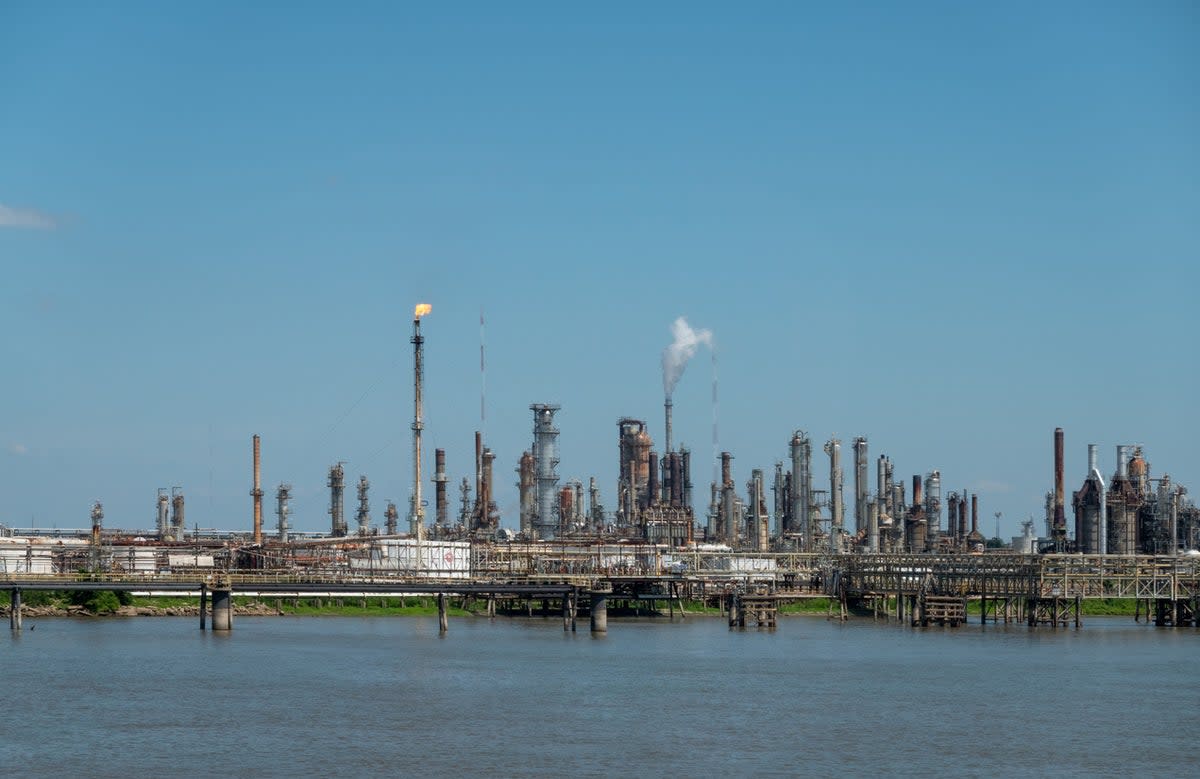Revealed: The biggest names on Wall Street backing top petrochemical polluters in US Gulf

A coterie of the biggest names on Wall Street have been revealed as the billion-dollar backers of some of the petrochemical industry’s most rampant polluters.
New analysis, shared exclusively with The Independent, focuses on petrochemical and refining facilities which produce everyday plastics, synthetic rubber, detergents and dyes – but can also result in highly toxic pollutants seeping into the air, land and water, and impacting the health of communities.
The research, from non-profit financial thinktank Planet Tracker, looked at plants responsible for petrochemical pollution in the Gulf states of Louisiana and Texas. More than a quarter of US petrochemical facilities are located in the region, and hazardous releases have increased since 2016, according to data from US Environmental Protection Agency’s (EPA) Toxics Release Inventory 2021.
According to the research, the most prevalent pollutants are asbestos, cobalt and chromium, which can be long-lasting in the environment, and get into the food chain.
These chemicals can have serious consequences for human health, ranging from short-term illness and irritations to neurological or developmental problems, long-term respiratory problems and several types of cancer.
Part of this Gulf region is widely known as “Cancer Alley” – a corridor of predominantly Black communities packed with petrochemical plants along the Mississippi River between Baton Rouge and New Orleans, Louisiana.
“The area is known for its higher-than-average cancer risk due to toxic air pollution, with an average facility (including petrochemical and non-petrochemical facilities) in Cancer Alley having production-related releases 3.3 times more toxic than an average facility in the rest of Louisiana,” the report states, citing EPA’s 2014 National Air Toxics Assessment.
Earlier this year, the EPA launched civil rights investigations into Louisiana’s environment department to investigate if permits approved for vast industrial projects in St John and St James parishes, and other places, violated Black citizens rights.
The study found that more than 75 per cent of hazardous releases in the studied Gulf region come from just five facilities. The top two plants are owned by Olin Corp and account for more than half of chemical releases, followed by facilities owned by Covestro, Valero Energy and BASF.
The analysis also follows the money behind the Gulf states’ petrochemical industry, and discovered an array of investment funds and multinational banks.
The top 10 investors in petrochemical facilities in the region overall are Vanguard, BlackRock, Berkshire Hathaway, State Street, Fidelity Institutional Asset Management (FMR), JPMorgan Chase, Geode Capital, Capital World Investors, Morgan Stanley and the Norwegian Government.
Within that list of Wall Street heavyweights, those investing most heavily in toxic pollution are BlackRock, Vanguard, FMR, State Street and the Norwegian Government, according to the analysis, based on an EPA metric of the potential health impacts caused by these toxic releases.
These organisations are dubbed “Global Ultimate Investors” (GUIs), due to their positions at the pinnacle of corporate ownership structure, and often many times removed from the direct running of petrochemical plants.
“As an absolute minimum, investors have a duty to be cognisant of the risks of toxic pollutants to local communities and the wider environment,” said John Willis, director of research at Planet Tracker and an author of the report.
“This is part of investment due diligence. They should be pivoting their portfolios away from the damaging impacts of the petrochemical facilities they fund, by pressuring companies to enact change.”
Planet Tracker’s dashboard lists more than 7,400 financial institutions with equity, debt or financing in Gulf petrochemical plants. The researchers utilised data sets collected by the EPA and also from Refinitiv, a provider of global financial market data and infrastructure.
The Independent has reached out to each company for comment on the report.
A Covestro spokesperson said: “The information about Covestro contained in the Toxic Footprints report released by Planet Tracker inaccurately interprets publicly available data in a gross misrepresentation of environmental releases. Specifically, the Covestro data is inaccurately portrayed as toxic environmental releases, when it actually represents a transfer weight for waste material that is shipped to other facilities for appropriate treatment and disposal. In fact, after treatment, which includes use as a fuel to offset the use of fossil fuels in other manufacturing processes, the release quantity in the report is effectively zero.
“Environmental stewardship, including the health and safety of our community and employees is an essential component of Covestro’s operations. Covestro continuously reviews our emissions management protocols across our entire operations, and, in many instances, actively surpasses EPA requirements, including obligations under the Resource Conservation and Recovery Act.”
A BASF spokesperson said: “BASF has no details regarding the information utilized by Planet Tracker and therefore is unable to comment on the validity of its methodology and analysis. However, the chemical industry is one of the most highly regulated industries in the U.S. BASF continuously cooperates with federal and/or state regulators and has built a track record of meeting or exceeding federal and state environmental, health and safety standards, including the permits issued pursuant to those standards. BASF regards protection of health, safety and the environment as our most important responsibility. We care about our employees and we care about our communities. We are committed to operating facilities in a safe and environmentally responsible fashion.”
A Vanguard spokesperson said: “For companies in which climate risks are material risks, we expect the boards of directors to oversee those risks and ensure they are properly disclosed and mitigated. This is a basic component of proper governance. If a company’s business practices or products put people’s health or safety at risk, they can present long-term financial risks to investors.”
The other named companies contacted have not responded.


